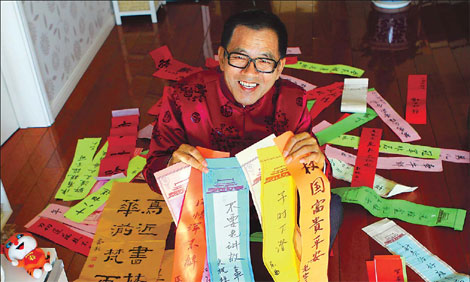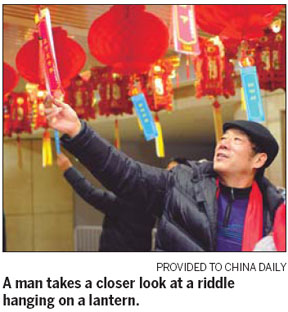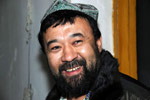Chinese Way
Riddler strives to revive art
Updated: 2011-02-17 09:55
By Qin Zhongwei (China Daily)
It is a common trend that most festivals worldwide adapt to the times and they sometimes become thinner. While the opportunities for fun remain or even enhance, the associated history is often sacrificed.
When asked for a description of Lantern Festival, most responses will state it is the last chance for fireworks, the end of the Spring Festival and an opportunity to consume vast numbers of delicious tangyuan.
 |
|
Chinese riddle creator Wang Qian will hold a lantern riddle guessing party on Feb 17 at Wuyutai's flagship tea shop in Beijing. Zou Hong / China Daily |
But Wang Qian wants the public to remember another point of the Lantern Festival, namely the tradition of gathering together to solve riddles.
Wang, a retired professor who lives in Beijing, aims to achieve this by hosting a lantern riddle guessing party at the flagship store of Wuyutai, Beijing's famed teashop, on Feb 17, with around 100 of his own riddles.
After falling in love with riddles as a child in the 1950s, Wang, now 66, spent his youth at riddle guessing parties in Changchun, capital city of Northeast China's Jilin province, where he challenged the older members to solve puzzles. In those days, Wang said the riddle-solving events were very popular nationwide during the festival period.
Before moving to Beijing, Wang, who taught physics at a university in Changchun, co-hosted a call-in radio program for seven years. His main role was to set riddles.
Through the radio slot, Wang earned a reputation for puzzles. It grew further after he was asked to create riddles for the 2006 CCTV Spring Festival Gala.
"Making riddles requires a lot of general knowledge," he said, adding that there must also be a desire to challenge others and an ability to present logical explanations. "Once you fall in love with making them, you cannot easily stop."
 |
Wang said he is always thinking of new riddles, no matter where he is or what he is doing. Even his dreams can present ideas, which are quickly noted down in the morning.
Tolerating this random and erratic behavior is a talent his wife Gao Lan has garnered over the years.
"If he comes up with a good riddle he will get more satisfaction than eating my homemade dumplings, which are his favorite," Gao said.
Although now mostly a forgotten art, Wang said the tradition has not completely disappeared in Beijing as there are others like him who take on the title of "riddle fan". They send each other their riddles as text messages.
Wang said his creations cover a range of subjects from Chinese literature to physics, chemistry and even banking.
"They say sports are contests for strong men, but I think riddles are contests of intelligence," he said. "Solving riddles are a good way for old men like me to use our brains."
History behind the tradition
The act of solving lantern riddles dates back more than 2,000 years, chiefly as a pleasure for the educated classes. Wang Qian, a riddle master, said the hobby reached its peak in the Song Dynasty (960-1279) when people from all walks of life took part, mostly during Lantern Festival.
Riddles were glued to lanterns that were considered the core element of the festival, which marks the 15th day of the first month of the lunar new year and the end of the Chinese new year period.
Riddle solving remained popular after the founding of New China in 1949. Many cities established their own riddle associations, with parties and contests held in parks, temple fairs and other public venues.
When United States President Richard Nixon made his well-known visit to China in 1972, he presented Guo Moruo, a notable Chinese writer and poet at the time, with his own riddle: "What are 12 items you can give to 1.2 billion Chinese, with everyone getting one?" Guo immediately answered they were the 12 animals of the Chinese zodiac.
However, with new trends stealing the attention of today's youth, the number of riddle fans is dropping nationwide. In Beijing, the long-standing Beijing Riddle Fans' Association has shrunk to 30 members, with an average age of 60.
"We are really looking forward to getting some new blood," said Zhao Chunlin, head of the association.
Specials

Spring Festival
The Spring Festival is the most important traditional festival for family reunions.

Top 10
A summary of the major events both inside and outside China.

A role model
Alimjan Halik had been selected as the "Cyberspace Personality Who Moved the Hearts of the Chinese in 2010".